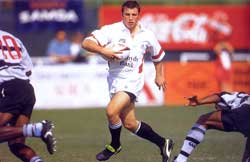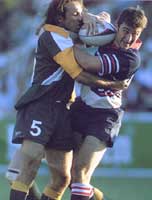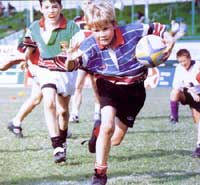A whole new ball game
The Middle East is regarded as one of the final frontiers that the sport of rugby is yet to conquer on it's global crusade. But as David Williams found out huge efforts are being made to introduce the game to a whole new audience
 The recent Rugby World Cup held in Wales was an overwhelming global success with countries across the world tuning in to extensive live coverage.
The recent Rugby World Cup held in Wales was an overwhelming global success with countries across the world tuning in to extensive live coverage.
It was hailed as the last great sporting event of the millennium and it reached the nooks and crannies of the planet where rugby has never had a look-in before.
One of those rugby outposts was the United Arab Emirates, which enjoyed live coverage of matches on its main terrestrial television station, and also saw comprehensive efforts to market the championship during its build-up.
Although recognised as a global game and played competitively in every continent, rugby has still not yet captured the imagination of the Arab race which has shown little interest in the game so far. But there are signs of change.
Tunisia and Morocco have been playing rugby for a number of years, and, even though they are not in the very top rank of international sides, can pose enough of a threat to keep the main rugby nations on their toes in either Sevens or 15s.
 Many an international side has underestimated the rate of progress these North African Arab nations have made over the past decade. Morocco, for example, have defeated a lot of teams at international Sevens tournaments, and Tunisia are consistent performers in the seven-a-side game. No longer are these sides the push-overs they were once thought to be.
Many an international side has underestimated the rate of progress these North African Arab nations have made over the past decade. Morocco, for example, have defeated a lot of teams at international Sevens tournaments, and Tunisia are consistent performers in the seven-a-side game. No longer are these sides the push-overs they were once thought to be.
In both these countries, there is a network of clubs and schools playing rugby, providing training and facilities for many young players - and a feeder to the higher levels of the game.
In the UAE too, there are signs that rugby is gaining in popularity in new areas, and considerable effort and finance is being dedicated to introducing the game to a wider audience here.
Rugby is a thriving expatriate sport in the Gulf. The Arabian Gulf Rugby Football League is an important part of life in the region with teams from Dubai, Sharjah, Bahrain, Abu Dhabi, Al Ain, Muscat, Doha and Kuwait fighting it out annually for the league and cup competitions.
Over the years these teams have been built up mainly from expatriates looking to play their favourite pastime and there have been few opportunities for locals to come through the ranks.
But times are changing in the Gulf and rugby is no exception.
John Griffiths, chairman of the Arabian Gulf Rugby Football Union, is keen to see the game developed here, and is encouraged by recent developments.
"There are a number of Arab nationals playing in the expatriate-dominated local sides of the UAE, Bahrain and Qatar. But these players have usually been educated abroad, or are in one of the foreign schools where rugby is played," said Griffiths.
"As individual players, they have a lot of potential and are good athletes, but the interest in the game tends to waver, and there are few sides dominated by Arab nationals. Another problem is the popularity of soccer, which, as elsewhere, has taken off in the Middle East."
Realising something substantial needed to be done, the AGRFU successful obtained financial backing from the International Rugby Board to appoint a full time Rugby Development Officer, and the arrival of Darryl Weir from South Africa has spawned some superb results already.
The modest 27 year-old has one of the toughest jobs in rugby - introducing it to a race that doesn't necessarily want to learn - but he has grabbed the challenge with both hands and is extremely encouraged by what he is witnessing after a year in the job.
"I am very happy with the way things have gone," he said. "I'm already visiting nine new schools in the UAE and I hope to spread this sort of progress into other parts of the Gulf.
"One good example of progress is in Sharjah, where they used to have 15 kids trained by three coaches. Now they have 50-60 kids training regularly with eight coaches. I went to Kuwait and was met by 70 kids who I had to coach on my own for a session. That was overwhelming too."
 Weir has also held sessions for teachers and parents to sharpen their skills and learn more about coaching so they can provide quality lessons for the kids when he is not around.
Weir has also held sessions for teachers and parents to sharpen their skills and learn more about coaching so they can provide quality lessons for the kids when he is not around.
Weir's magic is currently being weaved in mixed schools where Arab nationals are taught with expatriate children, and his next target is to get into the all-Arab schools.
"At the moment they would probably chase me down the road if I turned up to teach them rugby," he said. "They don't really know a great deal about the game but I am confident that will change in the very near future. My philosophy is to introduce the game in a fun way, to incorporate a rugby ball into simple games so they can at least get a feel for it."
The success stories are starting to come too. UAE nationals Badr Fikree and Majid Al Qassimi have have come through the ranks to push for first team positions at Dubai Exiles who are regarded as one of the top teams in the region.
"These boys are quality players and have got to their current status through hard work," said Weir. "They are a brilliant example of what I am trying to do. They have picked up the game at an early age and have got better as they have matured. They both have extremely good futures ahead of them in rugby. These are the first two Arab players to have come through the junior system and on to the adult scene, but I am sure they will be the first of many."
Weir has re-addressed the whole coaching structure in the region and come up with fixtures and leagues for a variety of ages.
"What we have here is real rugby development in terms of playing and facilities," he said. "There are so many issues that need to be looked at and I am getting excellent support from the union, the clubs and the schools.
"I get a tremendous amount of job satisfaction just seeing the smiles on the young kids faces when they make a pass or catch the ball for the first time. I don't care if the kids are black, white, brown, pink, yellow or whatever colour or sex; if they want to learn about rugby then I will help them."
Weir has had an excellent rugby schooling. His youth was spent playing for some of the top provincial sides in South Africa under the likes of former Springbok coach Jake White. One of his team-mates at youth level was James Dalton who progressed to the full South Africa side.
Despite studying to become a teacher in accountancy and business management, a flourishing rugby career was beckoning until a series of injuries brought an early halt to his aspirations.
"The doctor basically told me to pack it in or regret it. So I turned to coaching and have loved it ever since," he said.
Weir's coaches brilliance was picked up by the youth teams he used to be a part of and he soon found himself moving through the ranks. His big break came though when he travelled to Dubai with a South Africa U19 representative side for an international schoolboy tournament in 1998.
"I met a lot of people in Dubai and kept in touch with them after I returned to South Africa. A few months later I was contacted by the union to see if I wanted to take the post of Development Officer and here I am over a year on, and loving every minute of it."
Despite relishing his task, he admits it's not easy. "In the UK, if you had a job like mine and needed to go to Scotland you can just drive there. But in the Gulf, if I need to go to Doha or somewhere else I have to sort out visas, book flights etc, so it is different and more of a challenge."
Weir also struggles to keep a abreast of the latest developments and coaching techniques evolving, so during his summer leave he makes a point of attending workshops and visiting clubs back in his home country.
The local boy come good
 Badr Fikree was just like many other 16 year-old Arab boys in Dubai. He had a good group of friends, was doing well in school and was reaching the age where his body was developing fast and he wanted to stay in shape.
But Badr, at 19, is now a rare breed. He is a local boy who has taken to rugby and is actually become one of the best prospects in any background through the entire Middle East.
Badr Fikree was just like many other 16 year-old Arab boys in Dubai. He had a good group of friends, was doing well in school and was reaching the age where his body was developing fast and he wanted to stay in shape.
But Badr, at 19, is now a rare breed. He is a local boy who has taken to rugby and is actually become one of the best prospects in any background through the entire Middle East.
So what happened to the 16 year-old hanging out with pals to the 19 year-old who has become a linchpin of the Dubai Exiles scrum?
"I basically went to the Dubai Rugby Sevens four years ago and loved every minute of it," said Badr. "It was a great occasion and everyone there was having such a good time. It was a real eye-opener. I left there thinking that I've got to get involved in the game."
Four years ago, rugby among the Arab population was unheard of so Badr faced a challenged in the real meaning of the word. But advice came from an unlikely source... his mother!
"My mum is a physiotherapist and said rugby is the sort of contact game that would be good for developing my upper body and she encouraged me to play. I went to a couple of coaching sessions at the Dubai Exiles and it has since become an obsession. I love the game."
The club's junior side slotted Badr into the front row and he is now competing for a place in the full first XV at flanker.
Despite his good friend Majid Al Qassimi also making an impression down at the Exiles, the Arab flow of players coming through is still a trickle and the floodgates are far from being opened.
"I think it will take another generation before we see rugby being played on a wider scale," said Badr. "I know of some players and a lot of people ask me how to get involved but football is still the number one game. There are a lot of players at Under 10 level and I think when those boys reach 18 or 19 we should see more involved. They're coming up very slowly and I hope that if I can do well it encourages more to play.
"It's going to be tough to pull kids away from football because the local clubs look after their players so well. They don't have to pay for anything and even get picked up from home and dropped off again after by bus."
Badr has already captained the Dubai Exiles U19 side and is close to becoming the first Arab national to play for the Arabian Gulf representative side. His most memorable moment was crashing over between the posts in last season's International Schools tournament against Zimbabwe in Dubai.
"We lost 25-12 but that memory will live with me for a long time," he said. "Rugby has been played in Zimbabwe for over 100 years and yet the most anyone in our team had played was three years so it was a real achievement to have given them such a close run for their money."
Both Badr and Majid dedicate their weekends to rugby, and can be found down at the Exiles Rugby Club on many week nights too. Both are realistic about the future of the game amongst the Arab population, but both also realise that they are probably the best two ambassadors that the game probably has in rugby's bid to expand its boundaries to the sun drenched shores of the Arabian Gulf.